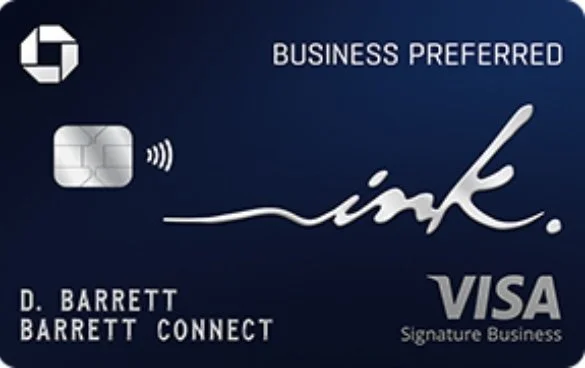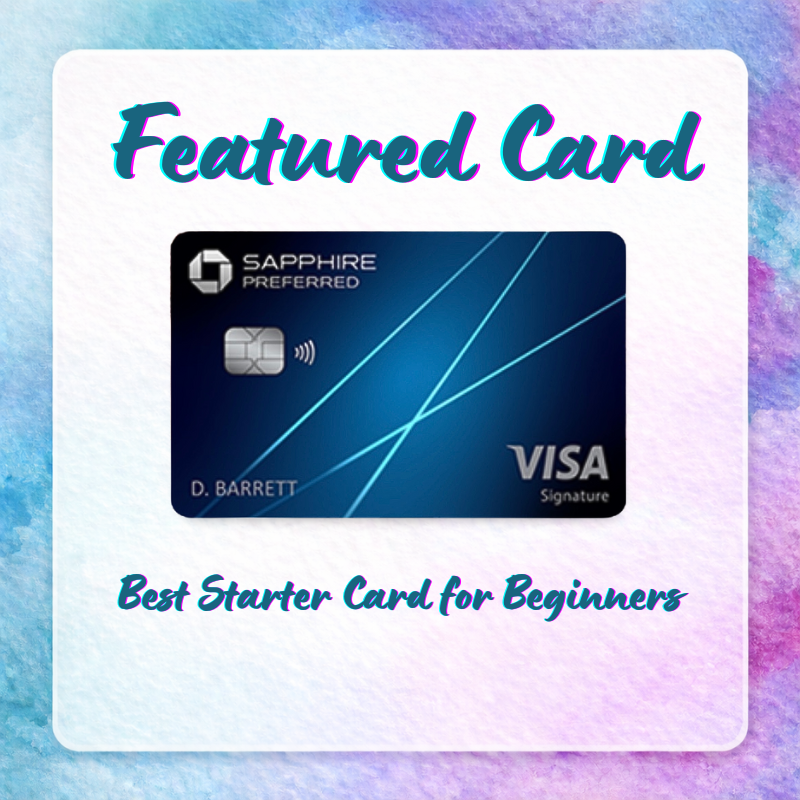How to Get a Business Credit Card (Even If You Don’t Think You Have a Business)
I want to pull back the curtain on a strategy that points and miles experts use to generate tons of rewards each and every year: signing up for business credit cards.
Now, before you click away thinking, "But I don't have a business!", hear me out! You don't need a full-blown company, employees, or even an LLC to qualify for a business credit card. Seriously.
If you've ever made money outside of a regular W-2 job, or if you're even planning to earn income on the side, you might already qualify.
Business credit cards are a game-changer for a few key reasons: they can help you rack up more points much faster, keep your spending incredibly organized, and open up a whole new world of welcome bonuses that you otherwise wouldn't be able to get.
In this comprehensive guide, we're going to walk through everything you need to know:
What actually counts as a "business" in the eyes of a credit card issuer
Why business cards are such a powerful tool for travel rewards
How to correctly fill out a business card application as a sole proprietor
Which beginner-friendly business cards I recommend to get you started
And crucial tips for getting approved and using your card wisely.
Let's jump in!
What Actually Counts as a "Business"? (It's Simpler Than You Think!)
A common misconception is that you need a formally registered entity, a team of employees, or to be generating massive revenue to be considered a "business." But that's just not true, especially in the context of business credit card applications.
If you are doing anything with the intent to earn income, even if it's just a small side hustle, you're generally considered a sole proprietor in the eyes of banks.
Think about it:
Selling goods: Do you sell items on eBay, Poshmark, Facebook Marketplace, Mercari, or Etsy?
Side Hustle Work: Are you doing DoorDash, Uber Eats, Instacart, or driving for ride-sharing apps?
Freelancing or Consulting: Are you a freelance writer, graphic designer, photographer, web developer, tutor, babysitter, dog walker, or consultant?
Content Creation: Do you run a blog, a YouTube channel, or an Instagram account with the goal to monetize it through ads, sponsorships, or affiliate links?
Rental Income: Do you manage a small rental property, like an Airbnb or Turo car?
Even if you've only made a few hundred dollars so far, or are just intending to make money from one of these activities, that counts as a business. You don't need to overthink it or wait for it to become a huge enterprise. Banks understand that small businesses and side hustles are incredibly common in today's economy.
Why Business Credit Cards Are a Secret Weapon for Travel Hacking
You might be wondering, "Why bother with a separate business card when my personal cards already earn points?" Great question! Here's why business credit cards are so incredibly valuable for maximizing travel rewards:
Massive Welcome Bonuses: This is often the biggest draw. Business credit cards typically offer much larger welcome bonuses compared to personal cards – think 75,000, 90,000, even 120,000+ points or miles for hitting a minimum spend. This means you can earn a huge chunk of points much faster, accelerating your path to free travel.
They (Usually) Don't Affect Your Personal Credit Report: This is HUGE for travel hackers! Most business credit cards generally do not report to your personal credit report unless you default on payments.
No Impact on Credit Utilization: This means they won't add to your personal credit utilization ratio, which helps keep your personal credit score healthy.
They Don't Count Towards Chase's 5/24 Rule: This is the golden ticket! Since most business cards don't show up on your personal credit report, they don't count against Chase's infamous 5/24 rule. This rule dictates that if you've opened 5 or more personal credit cards from any bank in the last 24 months, Chase will likely deny you for their cards. By signing up for business cards that don't report, you could theoretically open 2 personal cards and 10 business cards in two years, and your 5/24 count would only be 2, allowing you to access multiple lucrative welcome bonuses from Chase and other banks! To help you keep track of your 5/24 status, grab a copy of my FREE Credit Card Organizer Spreadsheet.
Important Note: While most business cards don't count, there are exceptions. Business cards from TD Bank, Discover, and some Capital One business cards do report to your personal credit and therefore will count against your 5/24 status. Always verify how a specific business card reports before applying.
Watch my YouTube video where I breakdown the Chase 5/24 Rule
Lucrative Bonus Categories: Business cards often earn excellent multipliers in spending categories that personal cards don't usually offer, such as office supply stores, internet, phone services, shipping, or online advertising. If you have business expenses in these areas, you can rake in points much faster. For instance, with some cards, you can even buy gift cards at office supply stores to earn bonus points on everyday purchases.
Easier Expense Organization: Keeping your business and personal expenses separate on different cards makes bookkeeping and tax time significantly simpler. No more sifting through personal transactions to find your business deductions!
How to Fill Out a Business Card Application as a Sole Proprietor
Applying for a business credit card as a sole proprietor is often simpler than people imagine. You'll typically fill out a mix of personal and business information. Here's a quick guide:
Authorizing Officer Title: Put "Owner." That's what you are!
Your Personal Info: You'll enter your full name, Social Security Number (SSN), date of birth, and home address, just like any other personal credit card application. This is because, as a sole proprietor, you are personally responsible for the account.
Business Structure: Select "Sole Proprietorship" or "Sole Proprietor." This is the default for most freelancers and side hustlers.
Legal Business Name: Simply use your full legal name. If you use a made-up business name that isn't legally registered (like a DBA), it might cause confusion or issues during the application process. Sticking with your personal name as the "business name" is usually the safest bet.
"Does your business use another name...?": Select "No" if you don't have a registered DBA.
Number of Employees: If it's just you, put "0" or "1" (depending on the wording; "0" is usually safest if you have no one else on payroll).
Federal Tax ID (TIN/EIN): You can just use your Social Security Number (SSN) here. You are not required to have an Employer Identification Number (EIN) unless you have employees or a specific business structure. IRS website to obtain EIN.
Business Address & Phone Number: Your home address is perfectly fine. You can also use your personal phone number.
Business Financials:
Business Start Date: Provide a rough estimate (month and year) of when you began your side hustle. It's a good idea to jot this down somewhere for consistency if you apply for more cards later.
Annual Business Revenue: Enter whatever you earned last year, or if you're just starting, provide a reasonable projection of your expected income for the year. Even $0 is okay if you're truly just launching!
Estimated Monthly Spend: Estimate how much you anticipate spending on the card each month for business expenses. A few hundred to a few thousand dollars is totally normal.
Business Category/Type: You'll typically scroll through dropdown menus to find the category that best describes your side hustle. For example, if you sell used items online, you might select "Retail" -> "Miscellaneous Retail" -> "Used Merchandise Retailers." Just pick the closest fit.
Will You Get Approved? (It's About Your Personal Credit!)
A lot of people hesitate, thinking they'll be denied because their "business" isn't big enough. But here's the deal:
Approval for a sole proprietor business credit card mostly comes down to your personal credit score and credit history. If your personal FICO score is around 680 or higher, and you've managed your personal credit responsibly (no late payments, low utilization), you've got a solid shot.
You do not need:
A registered business name (your legal name is fine)
An EIN (your SSN works)
Business tax returns (your personal income is often considered)
A website or a formal business plan
To be turning a huge profit (projected income is often accepted)
Banks approve small businesses and brand-new ones all the time. Don't let “imposter syndrome" hold you back! If you're doing anything with the intent to earn income, you do technically have a business, and it's perfectly legitimate to apply for a business credit card.
Best Starter Business Credit Cards for Travel Hacking
Ready to jump in? Here are a few excellent, beginner-friendly business cards that offer no annual fees and solid rewards, perfect for your first step into business card travel hacking:
Rewards: Earns an unlimited 1.5% cash back on everything (which translates to 1.5x Ultimate Rewards points if you also have a Chase Sapphire card!).
Welcome Bonus: Usually offers a very generous 75,000–90,000 Ultimate Rewards points after meeting the minimum spend.
Annual Fee: No annual fee! This is a fantastic catch-all card for non-bonused spending.
Rewards: Earns 5x Ultimate Rewards points on internet, phone, and office supplies (up to $25,000 spent annually). This is a HUGE win, as you can often buy gift cards at office supply stores to earn 5x points on almost anything!
Also: Earns 2x points at restaurants and gas stations (up to $25,000 spent annually), and 1x on everything else.
Welcome Bonus: Typically offers 75,000–90,000 Ultimate Rewards points.
Annual Fee: No annual fee! A favorite for a reason.
Rewards: Earns a flat 2x Membership Rewards points on all purchases, up to $50,000 per calendar year (then 1x after that).
Annual Fee: No annual fee! Membership Rewards points are incredibly valuable due to Amex's extensive list of transfer partners. This is an awesome card for all your unbonused business spending.
While these no-annual-fee options are fantastic starting points, there are so many other awesome business cards, often with annual fees, that can be extremely lucrative for points generation.
Some of my other favorites include the Barclays Wyndham Rewards Earner Business card (earns 8x at gas stations), the American Airlines World Elite Mastercard (for airline-specific perks), and the American Express Business Gold Card (for boosted spending in specific categories).
If you're not sure if an annual fee card is worth it for you, be sure to check out my guide on navigating annual fees for popular travel credit cards.
Pro Tips for Applying and Using Business Credit Cards
To ensure a smooth application process and maximize your rewards, keep these key tips in mind:
Don't Exaggerate: Be honest about your business's income and start date. It's totally fine for your business to be small or brand new. Remember, this is a legal credit card application, so honesty is paramount.
Don't Go into Debt for the Bonus: Only apply for a card if you are confident you can meet the minimum spending requirement through your regular business expenses without overspending. Some business cards have very large spend requirements (e.g., $15K-$20K in 3-6 months), so don't apply for them unless you have that kind of volume.
Track Your Expenses: Even if it's just a few transactions a month, consistently tracking your business expenses helps legitimize your business activity and makes tax time much easier.
Pay in Full: Always, always, always pay your full balance every single month. The interest you'll pay if you carry a balance will quickly wipe out any rewards you earn.
Final Thoughts
Business credit cards aren't just for established corporations or large enterprises. If you have a side hustle, freelance work, or even just a concrete plan to start earning income on your own, you likely qualify for a business credit card right now.
It's not about tricking the system; it's about understanding how banks define "business" and using the existing rules to your advantage. The rewards you can earn from just one or two well-chosen business cards can unlock thousands of dollars in travel value, helping you achieve your travel dreams faster.
So don't count yourself out! Understand the rules, be honest on your application, and start leveraging these powerful tools to your advantage.
Happy earning!
Learn more about Chase 5/24 Rule
Get a copy of my FREE Beginner’s Guide to Points and Miles





